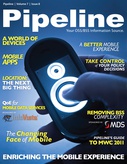|
|

Bates notes that Progress is working with a major entertainment group, who is planning on offering LBS to visitors to its amusement parks. The system can keep track of where visitors are, keeps an eye on lines at specific attractions to minimize wait times, and makes recommendations for the next ride to visit, all with the intention of making the experience personal and optimal for the visitor.
In addition, Bates references Lufthansa’s location-aware social networking solution, in which you can tell the service what your interests are and it will use location to create connections with other users on your behalf. The service, known as MemberScout, was developed by app developer Match2Blue using Progress’s Apama Business Event Processing platform.
While these are both enterprise
examples, the level of visibility that
wireless services providers have
|
|
GPS, like Social Networking, is both popular and widespread. |
|


unique, interactive experiences to build
stronger loyalty by tapping into
customer call patterns and locations,
correlating with customer preferences
and providing value added services to
customize each customer's experience
in a unique way.”
Bates also, however, notes something of utmost importance when considering the growth of location-based-services, especially if the central motivation is customer experience maximization: These services must be opt-in. Privacy concerns are of utmost importance, and while subscribers have demonstrated that they are more than happy to relinquish a degree of privacy in exchange for specific value, services that strike the consumer as invasive or heavy-handed are counter-productive, at the very least.
|
|
|
|
|

creates an even more compelling
business case for the utilization of
location as a customer retention and
experience optimization tool. I spoke
with Sanjay Kumar, Industry President
for Communications and Media at
Progress, and he told me that several
European service providers are already
using Progress’s Location Based
Promotions solution to correlate
customer location, usage patterns, and
customer preferences to send
subscribers relevant, real-time
offerings. This is a present-tense
example that is sure to be replicated
by providers around the globe.
The impetus for this connection is
summarized pretty well in a list of the
top ten telecom predictions released by
Progress in mid-December. Item
number three includes language that
sums up the motivation for service
providers to use location as a customer
satisfaction-based service
differentiator. As competitive forces
continue to build, wireless operators
“will need to provide customers with
|
|

However, provided that services remain fully opt-in, there are a number of reasons why location-based services are primed to emerge, increasingly, over the next few months and years:
Ubiquitous GPS
Once relatively uncommon, GPS is becoming de rigueur for smartphones (which are also becoming more and more widespread) and even less-sophisticated handsets. Berg Insight estimates that GPS was present in some 15% of handsets in Europe in 2010, but that the percentage is expected to increase to over half by 2013. In fact, some analysts project the compound annual growth rate for GPS-enabled handset sales to hit the 20-25% range between 2010 and 2013. Whereas consumer GPS was a specialized technology, often relegated to car-based black boxes just a few years ago, it is increasingly becoming table stakes in the mobile communications realm.
|
|
|






